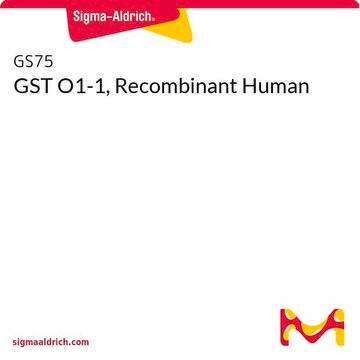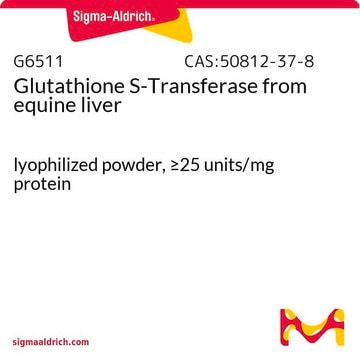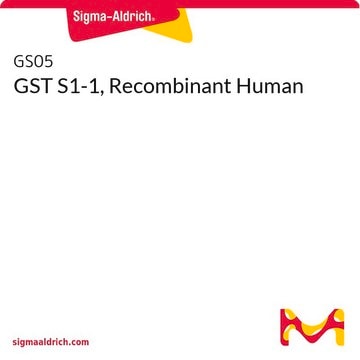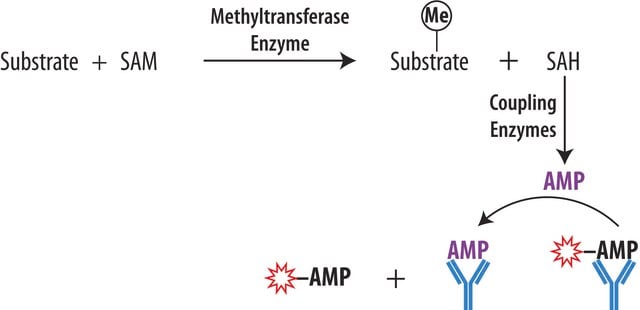GS71
GST K1-1, Recombinant Human
Synonym(s):
GST, GST 13-13, GST13, GST13-13, GSTK1-1, glutathione S-transferase kappa, hGSTK1
Sign Into View Organizational & Contract Pricing
All Photos(1)
About This Item
UNSPSC Code:
12352200
NACRES:
NA.26
Recommended Products
biological source
human
Quality Level
recombinant
expressed in E. coli
Assay
>95% (SDS-PAGE)
form
frozen liquid
specific activity
12.22 units/mg protein
mol wt
26 kDa
concentration
3.17 mg/mL
storage temp.
−70°C
Gene Information
human ... GSTK1(373156)
General description
using spectrophotometric determination of 1-chloro-2,4-dinitrobenzene (CDNB) conjugation with reduced glutathione (1 mM) in 100 mM NaPO4 (pH 6.5) at room temperature.
Biochem/physiol Actions
Glutathione S-transferase kappa 1 (GSTK1) is an enzyme that in humans is encoded by the GSTK1 gene. Glutathione S-transferases (GSTs) are a family of enzymes that play an important role in detoxification by catalyzing the conjugation of many hydrophobic and electrophilic compounds with reduced glutathione. Based on their biochemical, immunologic, and structural properties, cytosolic and membrane-bound forms of glutathione S-transferase are encoded by two distinct supergene families. At present, eight distinct classes of the soluble cytoplasmic mammalian glutathione S-transferases have been identified: alpha, kappa, mu, omega, pi, sigma, theta and zeta. The GSTs are thought to function in xenobiotic metabolism and play a role in susceptibility to cancer, and other diseases.
This gene encodes a member of the kappa class of the glutathione transferase superfamily of enzymes that function in cellular detoxification. The encoded protein is localized to the peroxisome and catalyzes the conjugation of glutathione to a wide range of hydrophobic substates facilitating the removal of these compounds from cells. Alternative splicing results in multiple transcript variants.
Storage and Stability
The enzyme should be used by the end-user customer within 1 year of receipt.
Storage Class Code
10 - Combustible liquids
WGK
WGK 1
Flash Point(F)
Not applicable
Flash Point(C)
Not applicable
Certificates of Analysis (COA)
Search for Certificates of Analysis (COA) by entering the products Lot/Batch Number. Lot and Batch Numbers can be found on a product’s label following the words ‘Lot’ or ‘Batch’.
Already Own This Product?
Find documentation for the products that you have recently purchased in the Document Library.
E V Kalinina et al.
Bulletin of experimental biology and medicine, 154(1), 64-67 (2013-01-19)
We studied the expression of genes encoding glutathione-S-transferase isoforms GSTP1-1, GSTA4-4, and GSTK1-1 during the development of the resistance of human erythroleukemia (K562), mammary adenocarcinoma (MCF-7) and ovary adenocarcinoma (SKOV-3) cells to cisplatin (CDDP). It was found that drug resistance
Anna Robinson et al.
The Biochemical journal, 379(Pt 3), 541-552 (2004-01-08)
The Kappa class of GSTs (glutathione transferases) comprises soluble enzymes originally isolated from the mitochondrial matrix of rats. We have characterized a Kappa class cDNA from human breast. The cDNA is derived from a single gene comprising eight exons and
Jie Li et al.
Protein science : a publication of the Protein Society, 14(9), 2361-2369 (2005-08-06)
Glutathione transferases (GSTs) are a superfamily of enzymes that play a vital functional role in the cellular detoxification process. They catalyze the conjugation of the thiol group of glutathione (GSH) to the electrophilic groups of a wide range of hydrophobic
Fabrice Morel et al.
The Journal of biological chemistry, 279(16), 16246-16253 (2004-01-27)
Kappa class glutathione S-transferase (GST) cDNA sequences have been identified in rat, mouse, and human. In the present study, we determined the structure and chromosomal location of the human GST Kappa 1 (hGSTK1) gene, characterized the protein, and demonstrated its
Our team of scientists has experience in all areas of research including Life Science, Material Science, Chemical Synthesis, Chromatography, Analytical and many others.
Contact Technical Service







